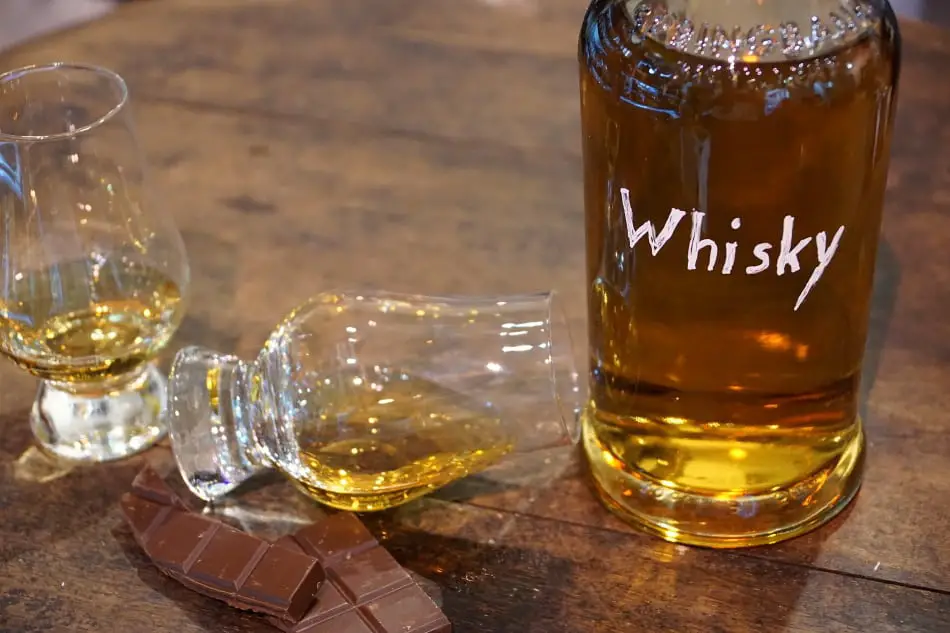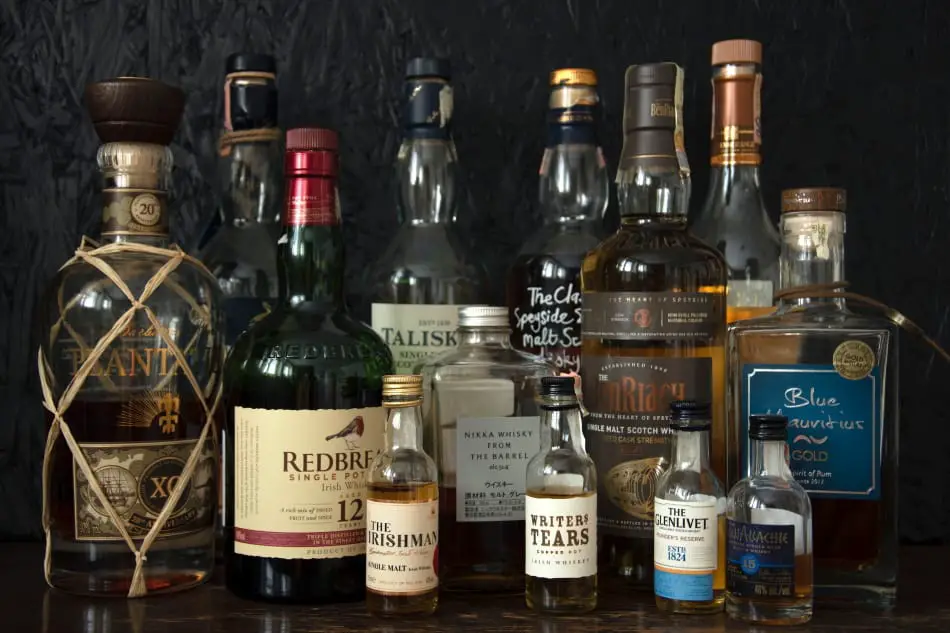Whether you want to have several different bottles of whiskey open at the same time so you can switch between them, or you want to know whether to refuse a drink from a bottle that’s been sitting on the bookshelf since 1976, or you just want to know how long you’ve got to finish your bottle: either way you’ll want to know exactly how long whiskey lasts once opened. Here’s everything you need to know.
An opened bottle of whiskey lasts indefinitely and does not expire, although its flavors will change after 6 months to two years as the air the whiskey comes into contact with, slowly oxidizes it. Fortunately, it’s easy to slow down the process of oxidation and prolong the life of your whiskey.
In the rest of this article, I’ll explain why opened bottles of whiskey last indefinitely and what can cause them not to. I’ll also explain why oxidation changes the flavors of your whiskey and what you can do to slow down the process, so that your whiskey keeps its original flavors for as long as possible.

Why Opened Bottles of Whiskey Last Indefinitely
Whiskey is pretty hard to damage so even opened bottles last indefinitely. The reason for this is because it only ages and picks up its flavors in the casks it’s matured in, so once it’s bottled it doesn’t continue to age and change until it starts to deteriorate and eventually expire.
Also, its high level of alcohol (more than 40%ABV) freezes the whiskey’s esters, congeners and volatile alcohols, which puts them in a type of suspended animation, preserving them and preventing them from deteriorating. The whiskey’s high level of alcohol also creates an inhospitable environment for the bacteria that would otherwise cause it to go bad.
Of course, whiskey will only last indefinitely if you don’t do anything to damage it. For opened bottles of whiskey this means storing it where it isn’t exposed to direct light or worse direct sunlight.
That’s because direct light or sunlight creates a chemical reaction in the volatile compounds of the whiskey which causes them to break down, and its flavor will degrade within one or two months. The whiskey will taste much harsher, possibly even of rubber, paint thinner or rotten fruit.
I have written a more detailed article about what causes even unopened bottles of whiskey to go bad, which you can find here.
Why The Flavors of Opened Whiskey Changes
As soon as you open a bottle of whiskey it becomes exposed to the air, and it will start to oxidize. Oxidation is when oxygen binds to one chemical compound and turns it into another, and in whiskey that means binding to one flavor compound and turning it into another. This doesn’t cause your whiskey to go bad or expire – it’s still drinkable, but it does mean that it won’t taste the way it’s supposed to.
Although oxidation starts as soon as you open the bottle, it doesn’t change the flavors of your whiskey immediately. That takes anywhere from six months to two years depending on the following:
- Headspace – the empty space in your bottle between the cork or lid and the whiskey that’s actually air.
- Seal of the bottle – whether the seal of your bottle is tight, loose or damaged.
- Storage environment – whether your bottle is stored in a stable environment or one with fluctuating temperatures.
The common denominator of all three is how much air can get to your whiskey. More headspace, a loose or damaged seal and being stored in an environment with fluctuating temperatures all mean more air will get to your whiskey and its flavors will change sooner. Less headspace, a tightly sealed lid and being stored in a stable environment all mean less air will get to your whiskey and it will take longer for its flavors to change.
So, for example, if there’s an inch or two of headspace there won’t be much effect on the whiskey’s flavors for at least a year, but if three quarters of the bottle is air, the quality of the whiskey inside will degrade in about a month.
How To Prolong the Life of Opened Bottles of Whiskey

As mentioned, once you open a bottle of whiskey and expose it to the air, the process of oxidation starts and there’s nothing you can do to stop it. There are, however, several things you can do to slow it down and help your whiskey keep its original flavors for as long as possible.
1. Keep The Bottle Tightly Closed
The first thing you can do is to ensure that you keep the bottle tightly closed. Obviously, the tighter the lid or the cork, the less oxygen can get into the bottle, and the longer it will take for your whiskey to oxidize and lose its original flavors.
If your bottle has a twist on lid then you should retighten it regularly as they often become loose on their own. If the original cork does not seal your bottle well, buy a poly seal cap that will seal the bottle better. You can find poly seal caps on Amazon here . Just make sure to get the best fit for your particular bottle.
. Just make sure to get the best fit for your particular bottle.
If you’re planning on storing your whiskey in a decanter, make sure the stopper is not just a loose-fitting lid but a seal that’s as airtight as possible. Also, the stopper should be made from the same material as the decanter, so that when they expand and contract as the temperature changes, they’ll do so at the same rate, and not leave tiny gapes where air can seep in.
I have written a more detailed article about what kind of decanter to use for storing whiskey, which you can find here.
There’s also the option of transferring your whiskey into a hermetically sealed glass container. However, since the sealing process takes some time, this option is only useful if you want to store your opened whiskey long term, not when you want regular access to it.
2. Store The Bottle in A Stable Environment
The second thing you can do to slow down the process of oxidation and help your whiskey keep its original flavors for as long as possible, is to store it in a stable environment where the temperature doesn’t fluctuate too much. That’s because with every fluctuation, oxygen can flow into the bottle which speeds up the process of oxidation.
Of course, storing your whiskey properly is always a good idea and will help you prolong the life of your whiskey whether it’s opened or unopened. I have written a more detailed article about how to store whiskey, which you can find here.
3. Transfer Your Whiskey into A Smaller Bottle
Oxidation becomes more of a problem as time goes on. That’s because you’re drinking your whiskey, which increases the amount of headspace and air in the bottle and therefore, the speed of oxidation. While a tight seal and a stable storage environment are effective at keeping air out of the bottle, they can’t do anything about the increasing amounts of air already inside the bottle with your whiskey.
The solution to this is to transfer your whiskey into a smaller bottle where the headspace will be far less. Even if the amount of headspace in the new bottle is not as small as it was when you first opened your whiskey and you haven’t slowed down oxidation to the minimum, it still won’t be as fast as it otherwise would be with all that extra headspace.
Of course, this is only a temporary solution as you’re still drinking your whiskey so after some time there will be too much headspace in the new bottle too. You can repeatedly transfer your whiskey into progressively smaller bottles, but at some stage the best solution will be to finish your whiskey as soon as possible.

